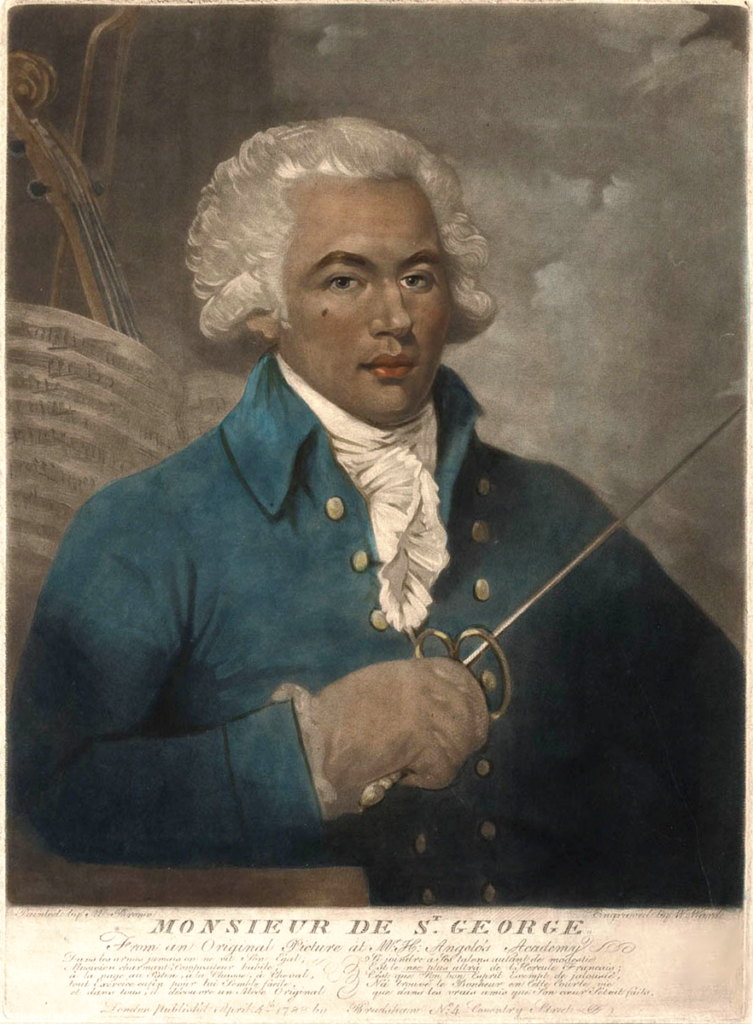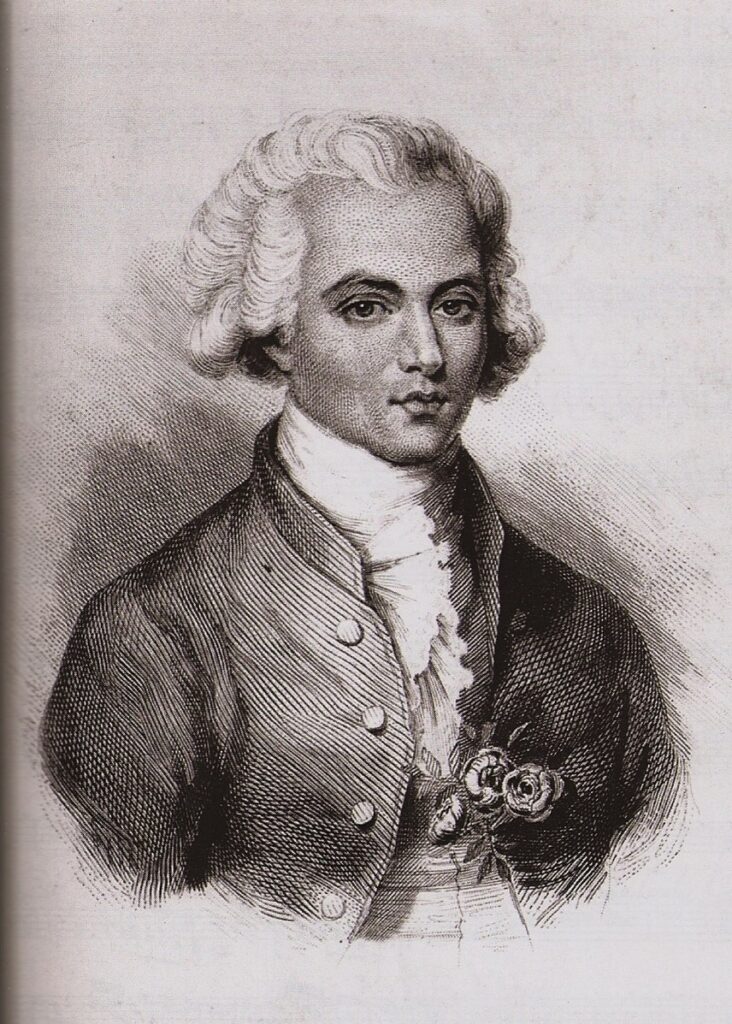Chevalier de Saint-Georges was a jack of all trades. He was an accomplished swordsman, a military colonel, and a musical virtuoso, conductor, and composer. He was often referred to as the Black Mozart, which should tell you why his name is not as renowned as other musical geniuses.
Being Black or mulatto hindered Chevalier de Saint-Georges’ greatness in terms of public perception. But there is no mistaking his awe-inspiring achievements in several fields. This article gives him credit as one of the best musicians of his time while being one of the most skilled fencers.

He Was Born Joseph Bologne
Chevalier de Saint-George was born Joseph Bologne. He was the first biracial man to gain fame as a classical composer in Europe.
Bologne has more than 40 compositions under his name in different musical fields. The number pertains only to those that were uncovered and recognized. Many more were lost with time.
Early Life
Bologne was the illegitimate son of plantation owner Georges Bologne de Saint-Georges and his slave Nanon. Bologne was born on December 25, 1745, in the French territory of Guadeloupe in the Caribbean.
De Saint-Georges was legally married to Elisabeth Merican when he impregnated Nanon. However, he never neglected Bologne, although the biracial boy would never be recognized as a noble because of his illegitimacy.
When Bologne was only two years old, de Saint-Georges was accused of murder following a duel gone bad. He fled to France and was later joined by Bologne and Nanon. After he was granted pardon two years later, the family of three returned to Guadeloupe.
But when Bologne turned seven, he returned to France because his father wanted to provide him with the education that was meant for children of his stature. After all, he was the son of one of the major landowners in Guadeloupe.

Promising Fencer
It was unclear when exactly Bologne started playing music. Instead, it was his skills in fencing that gave him acclaim in his young life. Bologne was enrolled in a fencing academy where he excelled at the young age of 13.
Bologne was so good that he defeated fencers older than him. One of them was Alexandre Picard, a known fencing master who often made fun of Bologne because he was mulatto.
After graduating from the academy, Bologne was given the title of Gentleman of the King’s Chamber and became a chevalier, the French equivalent of knighthood. As he was also allowed to carry his father’s family name, Bologne was formally referred to as Chevalier de Saint-Georges.
Aside from fencing, Bologne was also reported to have excelled in equestrian, dancing, swimming, ice skating, shooting, and of course, music.
U.S. President John Adams described Bologne as “the most accomplished man in Europe in riding, running, shooting, fencing, dancing, and music.”
Musical Career
Aside from being a good fencer, Bologne became popular as a musician and composer in his adult years.
Little is known when Bologne started playing music but wealthy families are known to hire tutors for their young children. Bologne proved an exceptional violinist.
It was his performance that endeared him to his audiences, particularly the women. His performance was described as “pushing the instrument to its limits.”
“By the mid-1760s, his name starts to appear as a dedicatee of violin pieces published by other virtuosos in Paris, indicating that his talents were beginning to be recognized,” Julia Doe, Assistant Professor of Music at Columbia University in New York, told the Guardian in a 2023 feature on Bologne. “Then within just a few years, he was quite firmly established on the Parisian musical scene.”
In terms of music, he didn’t do just one thing. Bologne was a master of many—playing in symphonies, composing symphonies and orchestras, and working as an ensemble director.
During his career, he was credited with composing many musical works:
- Wrote 6 operas
- Composed symphony concerts
- Composed 14 violin concertos
- Composed 5 sonatas
- Composed 3 musical pieces for string quartets
- Composed 13 vocal musical pieces
These were the accomplishments discovered after the French Revolution but he probably had more musical achievements.
In 1773, Bologne became the conductor of Le Concert des Amateurs. However, it had to disband due to a lack of funding. That didn’t stop Bologne from performing in many events, including private ones. Queen Marie Antoinette became one of his fans and would often invite him to private concerts.
Bologne was recommended as the next director of the Paris Opera. However, being of mixed race, several actors opposed the proposed appointment, saying they could never take directions from a mulatto.
He didn’t want to embarrass the queen, so he withdrew his name from contention. Bologne focused on writing music instead.
Military Career and Death
When the French Revolution happened, Bologne served in the National Guard. But he continued to compose and give concerts on the side.
Even in war, Bologne excelled. He was a leader, which prompted his immediate rise to military captain and colonel the next year. He famously led an all-Black regiment during the war.
Politics was a big part of the war and Bologne fell victim to it. He was sentenced to jail for “unrevolutionary behavior.” He reportedly used revolutionary funds to pay off his debts.
While his father was wealthy and later declared a noble, being illegitimate and of mixed race didn’t afford Bologne the many rights enjoyed by white people. The senior de Saint-Georges died in 1774. He left some money to Bologne but his legitimate child inherited his plantation.
His musical practices were also mentioned as one of his many faults. Bologne’s ties with Marie Antoinette, who was executed for being a traitor, were also examined.
Eventually, all of the charges against Bologne were dismissed.
He went back to composing music and died in June 1799 from a bladder disease. He was 53 and left no family behind. Bologne reportedly had many dalliances with women but never married anyone. His stature meant he cavorted with white noblewomen, but his color prevented him from being equal to them.
Why Was He Called the Black Mozart?
Bologne was often referred to as the Black Mozart because not many nobles deigned to give him a proper moniker because of the color of his skin. There was evidence that Bologne met Austrian composer Wolfgang Amadeus Mozart since they lived in the same residence for a time.
They occupied the home of Baron von Grimm in Chaussee d’Antin between July and September of 1778. So, it’s very likely that the two musical geniuses interacted with each other.
However, being referred to as a Black Mozart was quite limiting. Bologne was his own person and achieved greatness through his talent and grit despite the color of his skin. Hollywood finally honored his name through the 2023 release of the film Chevalier starring Kelvin Harrison Jr. in the titular role.

